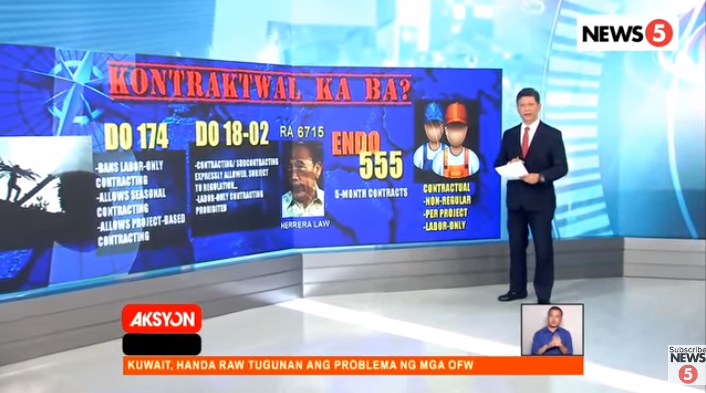Explaining What the Duterte EO Missed

Screengrab from News.TV5.com.ph’s website.
CHEERS TO two news media organizations for explaining on Labor Day what was missing in President Duterte’s executive order (EO) supposedly ending “endo.”
 While most media accounts reported only the statements and claims of government sources and labor and employer groups, two exceptions provided in-depth perspectives on labor contracting.
While most media accounts reported only the statements and claims of government sources and labor and employer groups, two exceptions provided in-depth perspectives on labor contracting.
News.ABS-CBN.com’s report explained why labor groups are dissatisfied with the EO: there was no provision requiring “direct hiring of the employee by the principal employer shall be the general norm in employment relations.” This report focused on the difference between the EO proposed by labor groups and that issued by the president. It also quoted Rep. Ariel Casilao (Anakpawis partylist), who said the EO is ‘just a reiteration of existing labor laws that have been proven anti-worker’ (“Explainer: Duterte admin’s ‘endo’ 2.0”).
The report also explained what were preventing the government from yielding to labor’s demands. It reported Labor Secretary Silvestre Bello III’s declaration that some industries require job contracting, and the president’s claim that it will be difficult to end “endo” without legislation.
A segment of Aksyon (TV5) provided more information. Anchor Ed Lingao defined labor contracting and provided examples of sub-contracting, seasonal job contracting and labor contracts on a per project basis. The three-minute report also recalled how some laws like RA 9175 (Herrera law), the Department of Labor and Employment’s Department Order (DO) 18-02 and DO 174 affect labor contracting. The report emphasized that existing laws do not ban contracting; they only regulate it (“EXPLAINER | ‘Endo’”).
Both reports compared the EO proposed by labor groups with the president’s version. The latter prohibits contracting or subcontracting only “when undertaken to circumvent the worker’s rights to security of tenure, self-organization, and collective bargaining and peaceful concerted activities pursuant to the 1987 Philippine Constitution.” The former would ban all forms of job contracting. Both reports noted that the president is aware that his EO has limitations, and that legislation is needed to amend the labor code.
The effort of these news organizations to make the complex issues involved understandable helps raise public awareness of the complexities involved in ending “endo,” despite which, Mr. Duterte promised during the 2016 campaign to summarily end it once he wins the presidency.
The Duterte campaign promise was made to win votes. It was further hyped up as he settled in office, raising expectations about ending “endo”. Unfortunately, not all the media paid attention to the claims of the parties in contention. It would have encouraged enlightening public discourse. Much of the media was instead content with merely recording what this or that side said, thus the validity of CMFR’s observation in a previous monitor that much of the coverage on “endo” was on the views of labor and employment groups. Indeed, “the reports did not elaborate on the reasoning behind Duterte’s change of approach; neither did the media look into how the security of tenure bill will address the lingering concerns of the labor sector” (See: “The Problem of “Endo”: Missing Links, Unexplored Issues (Updated)”).
Leave a Reply